“I have discovered in life that there are ways of getting almost anywhere you want to go, if you really want to go.”
Langston Hughes
In the years between 1916 and 1970, there was a massive movement in the United States called the Great Migration. It saw over six million African Americans relocate from the South and into the Northern States. Cities like Detroit, Baltimore, New York, and Chicago experienced huge shifts in their demographics. In 1910, 90% of African Americans lived in the south; after the Great Migration, only 50% remained.
The main cause of the movement was the increasingly widespread racist ideology in the Southern States. Racial segregation and discrimination, enforced by the harsh Jim Crow laws, led to the lack of social freedoms and economic opportunities for black people. Corrupt legal systems, unfair labour practices, and lynchings drove them north to search for a better life.
Another contributing factor was the shortages of labour in the northern industrial areas caused by the decrease of immigration from Europe after the start of the First World War.
This move into the densely populated cities would lead to a cultural eruption that started in one of the most popular destinations during the Migration; a neighbourhood in New York City, called Harlem.
The artistic, social, and intellectual movement which began there in the 1920’s would be called the Harlem Renaissance, or the New Negro Movement. It was characterized by black artists and writers who were striving to create a new identity for themselves and to explore new modes of cultural expression.
Langston Hughes, one of the most prominent writers of the Renaissance, said that Harlem gave them an opportunity “to express our individual dark-skinned selves without fear or shame.”
This is from Wikipedia:
“The Harlem Renaissance was successful in that it brought the Black experience clearly within the corpus of American cultural history. Not only through an explosion of culture, but on a sociological level, the legacy of the Harlem Renaissance redefined how America, and the world, viewed African Americans. The migration of southern Blacks to the north changed the image of the African American from rural, undereducated peasants to one of urban, cosmopolitan sophistication. This new identity led to a greater social consciousness, and African Americans became players on the world stage, expanding intellectual and social contacts internationally.”
However, the personal aims of some of the leading figures varied. Some tried to challenge existing stereotypes and incite social and political change with their work, while others thought to inspire and uplift their race with optimism and to preserve African American cultural traditions, without referring constantly to racism.
Two of the writers of the Harlem Renaissance, Zora Neale Hurston, and Richard Wright, would embody these conflicts in two of America’s greatest novels: Hurston’s Their Eyes Were Watching God published in 1937, and Wright’s Native Son, published in 1940.
These books were more than just stories. They were ideas, and what makes their author’s literary rivalry so interesting, is that much of what they disagreed on is still so relevant today. Together, the two classic works represent the lingering dichotomy of left and right wing politics.
Their Eyes Were Watching God
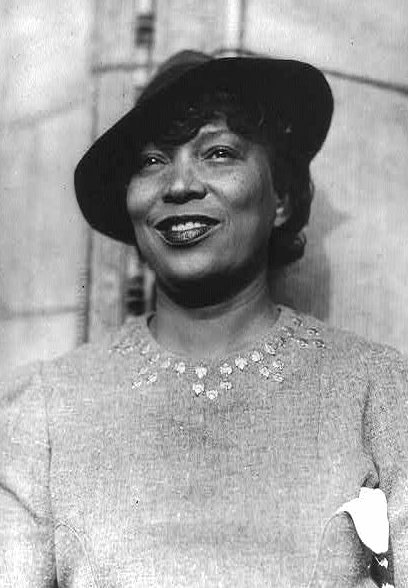
This is from the first line of Hurston’s novel.
“Ships at a distance have every man’s wish on board. For some they come in with the tide. For others they sail forever on the horizon, never out of sight, never landing until the Watcher turns his eyes away in resignation, his dreams mocked to death by Time. That is the life of men.”
Hurston’s opening paragraph echoes a sentiment felt by the ex-slave and abolitionist, Frederick Douglass in his autobiography:
“Our house stood within a few rods of the Chesapeake Bay, whose broad bosom was ever white with sails from every quarter of the habitable globe. Those beautiful vessels, robed in purest white, so delightful to the eye of freemen, were to me so many shrouded ghosts, to terrify and torment me with thoughts of my wretched condition… My thoughts would compel utterance; and there, with no audience but the Almighty, I would pour out my soul’s complaint, in my rude way, with an apostrophe to the moving multitude of ships:– “You are loosed from your moorings, and are free; I am fast in my chains, and am a slave! You move merrily before the gentle gale, and I sadly before the bloody whip!.”
Hurston’s continues with her second paragraph: “Now, women forget all those things they don’t want to remember, and remember everything they don’t want to forget. The dream is the truth. Then they act and do things accordingly.”
Hurston cleverly words her opening line using “man’s wish,” “his dreams” and “the life of men” to be interpreted as humanity as a whole. It’s not until the second paragraph that we understand more clearly Hurston’s intentions.
It’s here we get an early glimpse into the theme of feminism that permeates through the entire novel.
Unlike her contemporary writers, Hurston chose to write about love, sexuality, womanhood and individuality, many of which were ideas that were downplayed and minimalized under the greater issues of racial inequality.
She was an anthropologist who dedicated much of her life studying African American folklore, language, and culture. The speech in Their Eyes is written in the dialect of the south, in early 20th century Florida, where the novel takes place.
The story follows a woman named Janie Crawford, and it begins as Janie returns to her home town and tells her story to an old friend.
The plot is broken down into three narratives, each representing a different lover in Janie’s life.
Her first marriage is to an older farmer named Logan Killicks. Their relationship is loveless and bleak and she’s treated like an employee rather than a wife. She was forced into it by her grandmother who, with good intentions, tried to situate Janie into a financially safe and secure relationship.
‘Taint Logan Killicks Ah wants you to have, baby, it’s protection.”
Her grandmother was a slave, and her hope of a peaceful and uneventful life for Janie was influenced by the absence of safety and comfort during her own life. Janie on the other hand, not having had the terrible experience of living through slavery, dreams of a more fulfilling life for herself. It reminds me of a quote from Alexander Dumas, who said:
“There is neither happiness nor misery in the world; there is only the comparison of one state with another, nothing more.”
Alexandre Dumas
After two years with Logan, she runs away with man named Joe Starks. He is ambitious and charismatic and he takes her with him to the first all black community in the United States.
Fun Fact! Hurston actually grew up in this community in Florida, called Eatonville.
Joe is obsessed with money and status. He becomes the mayor of the town and builds a community that includes a general store and a post office. He gets rich and treats Janie like a trophy as he flaunts her as the mayor’s wife. Even though Janie has both wealth and power here, she’s excluded from attending local events and is kept from participating in the town gossip around the store.
The novel jumps ahead 20 years without much of a paragraph describing the interval. It’s suggestive of an uneventful and bland existence for Janie. Eventually, her second husband dies and Janie meets her third lover.
His name is Vergible Woods. Everyone calls him Tea Cake. He is several years her junior, but the two fall in love and they move to the Everglades to work in the muck and pick beans.
It’s a vivid contrast to her past marriages with Joe or Logan. Tea Cake doesn’t treat her like an employee like Logan had done, nor exclude her like Joe had done. He makes Janie feel free and liberated and even teaches her to play checkers, something Joe kept from her.
Tea Cake isn’t perfect though. At one time he steals Janie’s money, runs off, and gambles it away. He also beats her occasionally, not because he wants to, but because he feels his society demands it of him.
Still, Janie, Tea cake, and their community have fun, and they’re happy.
But the good times don’t last long. During a hurricane that storms through the Everglades, Tea Cake is bitten by a Rabid dog and gets rabies. Janie is forced to shoot and kill Tea Cake who, in his madness, tries to kill her.
After the trial, in which the judge takes pity on her and recognizes the genuine love she had for Tea Cake, she’s absolved of her crime. Janie then moves back to Eatonville, with money, freedom, individuality, and experience; satisfied, for the first time with herself and at peace with her existence.
“Two things everybody’s got tuh do fuh theyselves. They got tuh go tuh God, and they got tuh find out about livin’ fuh theyselves.”
Zora Neale Hurston
Throughout the novel, Janie is denied something in all three of her marriages, but she learns something about herself from each one of them. It wasn’t until her last marriage with Tea Cake, where she is finally treated like an equal, that she finds her sense of self and individual fulfilment.
Their Eyes is about love and self-discovery. Its optimistic and uplifting. Even though the ending is sad, we see a transformation that had taken place in Janie. After she tells her story, her friend phoeby declares: “Lawd! Ah done growed ten feet higher from jus’ listenin’ tuh you, Janie. Ah ain’t satisfied with mahself no mo’. Ah means tuh make Sam take me fishin’ wid him after this.”
“Janie saw her life like a great tree in leaf with the things suffered, things enjoyed, things done and undone. Dawn and doom was in the branches”
Zora Neale Hurston
Unfortunately, Their Eyes wasn’t received very well at the time of its publication. Hurston lived in relative obscurity and poverty for most of her life. It wasn’t until the 1975, fifteen years after Hurston’s death, that Alice Walker (The Colour Purple) published an essay documenting her search for Hurston’s unmarked grave, and revived the literary classic.
Walker defended Hurston saying she was: “wildly in love with people of colour.” When people read her work they “saw this unstoppable joy, I mean, your not supposed to be joyful, your down there being lynched, you know, your supposed to be always picketing something, and if your not picketing at least you’ll be sending our leaflets and fighting. But to actually have joy in your life is a great victory. That is what I feel Hurston left us; this ability to understand what true success is. True success is about being happy, it’s about doing what you have to do to survive. You have your good times, you have your dances, you have music, this is it. She shared this with us, at great cost to herself.”
Walker found Hurston’s grave and had a tombstone with the words: “A Genius of the South” inscribed on it.
One of the novel’s most vocal critics was Richard Wright, who accused Hurston of “Voluntarily continuing in the novel the tradition which was forced upon the Negro in the theatre, that is, the minstrel technique that makes ‘the white folks’ laugh.”
Wright felt that Their Eyes carried: “no theme, no message, no thought.” He claimed that: “her novel is not addressed to the Negro, but to a white audience whose chauvinistic tastes she knows how to satisfy.”
Strong words, but it wasn’t all negative.
“Miss Hurston can write,” he admitted, “Her dialogue manages to catch the psychological movements of the Negro folk-mind in their pure simplicity, but that’s as far as it goes.”
Wright’s criticisms were borne out of his opposing political ideology. Hurston was a conservative and her political views, however subtle, shine through her work.
In the novel, one of the most influential black leaders of the late 19th century, Booker T. Washington, is mentioned. His name is brought up when a hateful and disliked woman calls him a: “white folks’ nigger.” Janie disagreed, she believed him to be a great man.
Washington had controversial views about the path to equality. He felt that blacks had to accept discrimination for a while and should concentrate on elevating themselves through hard work and material prosperity.
In a rivalry, much like Hurston’s and Wrights, W.E.B. Du Bois, a black intellectual and political thinker disagreed with Washington’s ideas. He said that they would serve only to perpetuate white oppression. Du Bois fought for political action and a civil rights instead.
Hurston didn’t believe in what she called the: “sobbing school of Negrohood,” nor did she feel, in her words: “tragically coloured.”
She believed in empowering individuals to obtain economic and social justice on their own, without the help of liberal government interventions. Despite her novel only lightly touching on race and politics, she was frequently vocal about her opinions in letters and other writings:
“Suppose a Negro does something really magnificent, and I glory, not in the benefit to mankind, but in the fact that the doer was a Negro. Must I not also hang my head in shame when a member of my race does something execrable? The white race did not go into a laboratory and invent incandescent light. That was Edison. If you are under the impression that every white man is Edison, just look around a bit.”
“If I say a whole system must be upset for me to win, I am saying that I cannot sit in the game, and that safer rules must be made to give me a chance. I repudiate that. If others are in there, deal me a hand and let me see what I can make of it, even though I know some in there are dealing from the bottom and cheating like hell in other ways.”
She rejected, mockingly, the need of social welfare: “We were brought here against our will. We were held as slaves for two hundred and forty-six years. We are in no way responsible for anything. We are dependants. We are due something from the labours of our ancestors. Look upon us with pity and give!”
“Sometimes I feel discriminated against, but it does not make me angry. It merely astonishes me. How can anyone deny themselves the pleasure of my company? It’s beyond me.”
Zora Neale Hurston
Three years after Their Eyes was published, Richard Wright would publish his Novel, Native Son. Wright would say in a speech given after the novel was published that “The birth of Bigger Thomas (the main character) goes back to my childhood, and there was not just one Bigger, but many of them, more than I could count and more than you suspect.”
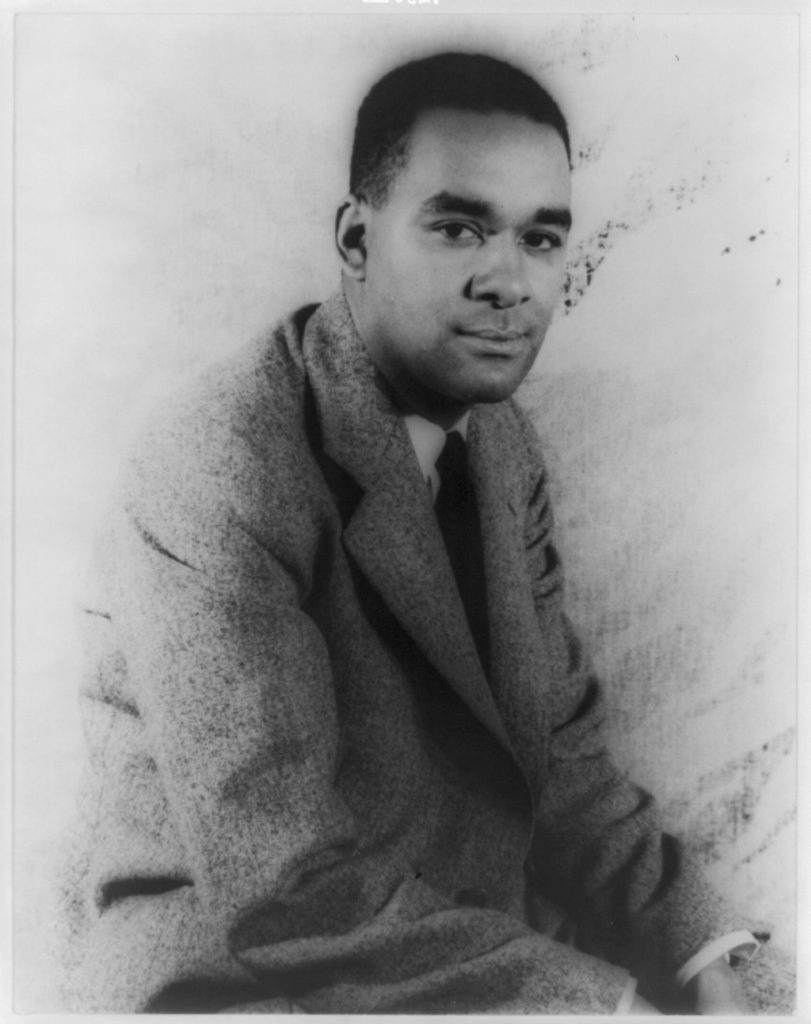
Native Son
In a striking contrast between the two novels, Native Son is violent, angry, and hateful. It’s a gripping and tense train wreck of psychologically descriptive and harrowing accounts of racism in the early 20th century.
Wright would comment that after he had seen some reviews come in of a previous book of short stories that he had written called Uncle Tom’s Children: “I realized that I had made an awfully naive mistake. I found that I had written a book which even bankers daughters could read and weep over and feel good about. I swore to myself that if I ever wrote another book, no one would weep over it; that it would be so hard and deep that they would have to face it without the consolation of tears.”
Wrights intention with the novel was to awaken the realities of racism in America. He felt that the nation faced a great danger, one that would destroy the country if it wasn’t properly addressed.
“I felt that if I drew the picture of Bigger truthfully, there would be many reactionary whites who would try to make of him something that I did not intend. And yet, and this is what made it difficult, I knew that I could not write Bigger convincingly if I did not depict him as he was: that is, resentful toward whites, sullen, angry, ignorant, emotionally unstable, depressed, and unaccountably elated at times, and unable even, because of his own lack of inner organization which American oppression had fostered in him, to unite with the members of his own race.”
“The more I thought of it the more I became convinced that if I did not write of Bigger as I saw and felt him, if I did not try to make him a living personality and at the same time a symbol of all the larger things I felt and saw in him, I’d be reacting as Bigger himself reacted: that is, I’d be acting out of fear if I let what I thought whites would say constrict and paralyze me.”
In the novel, Bigger, his mother, sister, and brother live in a cramped, one bedroom apartment on the south side of Chicago in the 1930’s. Wealthy real estate owners refuse to rent out apartments to black people in white neighbourhoods, because of that, the south side, or the”black belt,” is overpopulated and the rent is artificially inflated.
Wright’s descriptions of Bigger’s thoughts are somber, and hopeless.
“…he hated his family because he knew that they were suffering and that he was powerless to help them. He knew that the moment he allowed himself to feel to its fullness how they lived, the shame and misery of their lives, he would be swept out of himself with fear and despair. So he held toward them an attitude of iron reserve; he lived with them, but behind a wall, a curtain. And toward himself he was even more exacting. He knew that the moment he allowed what his life meant to enter fully into his consciousness, he would either kill himself or someone else. So he denied himself and acted tough.”
Bigger gets a job as a driver for the Daltons, a wealthy, white family who want to give twenty-year-old Bigger an opportunity. On his first night, Mary, the daughter, asks Bigger to drive her to the university. However, she skips class and makes him pick up her boyfriend instead, a man named Jan. The three of them go to a restaurant in the black belt. Throughout the night, Mary and Jan treat Bigger like an equal, but it’s humiliating to him.
“Did not white people despise black skin? Then why was Jan doing this? Why was Mary standing there so eagerly, with shining eyes? What could they get out of this? Maybe they did not despise him? But they made him feel his black skin by just standing there looking at him… He felt he had no physical existence at all right then; he was something he hated, the badge of shame which he knew was attached to black skin. It was a shadowy region, No Man’s Land, the ground that separated the white world from the black that he stood upon.”
“At that moment he felt toward Mary and Jan a dumb, cold, and articulate hate.”
His treatment by Mary and Jan confuses him. It runs contrary to his entire understanding of socially acceptable behaviour at the time.
“The moment a situation became so that it exacted something of him, he rebelled. That was the way he lived; he passed his days trying to defeat or gratify powerful impulses in a world he feared.”
Bigger drives the couple around and they get drunk together. They drop Jan off and he takes Mary home. Because she is intoxicated, she needs to be helped up the stairs and into her room. As Bigger is putting Mary into bed, Mary’s mother is heard calling for her. She is blind and she slowly approaches Mary’s bedroom. Bigger, fearing that he would be accused of raping Mary if he was caught upstairs in her room, holds a pillow over Mary’s head to keep her quiet. Bigger unintentionally suffocates Mary. When Mary’s mother approaches, she smells the liquor and thinks the unresponsive Mary has just passed out and she leaves the room.
Bigger burns Mary’s body in the furnace and plans to blame the whole thing on Jan, who was a communist and was viewed with the same sort of animosity and suspicion as Bigger was.
“Though he had killed by accident, not once did the need to tell himself that it had been an accident. He was black and he had been alone in a room where a white girl had been killed; therefore he had killed her. That was what everybody would say anyhow, no matter what he said. And in a certain sense he knew that the girl’s death had not been accidental… His crime seemed natural; he felt that all of his life had been leading to something like this.”
The story continues with Bigger murdering his own girlfriend, Bessie, because he felt that she would reveal too much. Eventually he is caught and goes on trial for the death penalty. In court, the people seem to care less about the death of the Bessie than they do Mary.
Like Hurston, Wright would also face some hard criticism for his novel. His most noteworthy critic was the author James Baldwin. This is from an article from PushBlack.org: “The Revealing Conflict between Baldwin and Wright”:
“Baldwin’s main critique of “Native Son” was that it reinforced dangerous racial stereotypes about Black people. He argued that Wright used these disgusting depictions of Blacks to appease his white audience and sell more books. In essence, Wright “sold out” his own community by giving his characters stereotypical traits to make them palatable for whites in hopes to elicit their sympathy. Bigger Thomas, the story’s protagonist, was a murderer and rapist motivated by animal-like impulses while his supporting characters were petty criminals, mammies, and Negroes satisfied with an average life in the ghetto.”
“Representation matters in more than just novels, and that is why Baldwin took the time to address Wright. He understood that these were more than mere words on a page; these words carried consequences. If Blacks are perpetually portrayed as urban, criminal, lazy, and aggressive, people may truly believe that all Blacks fit those descriptions. This leads to a public that devalues the lives of Blacks and sees us as expendable. And ultimately, Baldwin believed Wright contributed to these destructive narratives.”
“It took many years of vomiting up all the filth I’d been taught about myself, and half-believed, before I was able to walk on the earth as though I had a right to be here.”
James Baldwin
In the novel, Bigger’s lawyer is a communist named Max, his defence is based on the unconscious effects of systemic racism and segregation. He points out all the unfair prejudices that Bigger had faced his whole life and he accuses society as a whole of killing Mary and Bessie.
“We are dealing here with an impulse stemming from deep down. We are dealing here not with how man acts toward man, but with how man acts when he feels that he must defend himself against, or adapt himself to, the total natural world in which he lives.”
Wright himself was a Marxist, and his ideologies are channeled through Max in the novel.
Marxism is a philosophical and economic theory that suggests that human societies and their development are the result of material conditions rather than ideals. It opposes private property and our current capitalist system. Marxists argue that our actions, our thought processes, and our ideas are caused by the existing class struggles present in our society.
Critics of Marxism claim that unlike socialism, capitalism isn’t a man made system at all, but is the beneficial consequence of the assumption that individuals are primarily motivated by self-interest; a variable that Marxists ignore.
I was surprised to learn that the founders of the current Black Lives Matter organization have stated publicly that they are “trained Marxists.” The mission statement on their website says that, in addition to liberating black people, the they want to, “alongside comrades,” “disrupt the Western-prescribed nuclear family structure.”
For Wright, it was a way for humanity to exist on equal terms. He would write that “I was a communist because I was a Negro. Indeed the Communist Party had been the only road out of the black belt for me.”
CONCLUSION
Despite Hurston and Wright both striving for equality for themselves and their race, why do their books contain such opposing ideologies? Although Hurston might have avoided politicizing her works, she was still aware of the racial inequality present in society, she just believed in a different solution.
The economist Thomas Sowell, who was himself a Marxist early in his career for the same reasons as Wright, wrote a book called A Conflict of Visions to help simplify and explain the root of these political conflicts.
In it, he breaks down two concepts that he calls the “unconstrained vision” and the “constrained vision.”
This is from Wikipedia:
“Sowell argues that the unconstrained vision relies heavily on the belief that human nature is essentially good. Those with an unconstrained vision distrust decentralized processes and are impatient with large institutions and systemic processes that constrain human action. They believe there is an ideal solution to every problem, and that compromise is never acceptable. Collateral damage is merely the price of moving forward on the road to perfection. Sowell often refers to them as “the self anointed.” Ultimately they believe that man is morally perfectible. Because of this, they believe that there exist some people who are further along the path of moral development, have overcome self-interest and are immune to the influence of power and therefore can act as surrogate decision-makers for the rest of society.”
It’s this “morally perfectible man” that is absolutely necessary for Marxism and socialism to work. In this view, intention matters more than consequences. Social change and public policy are implemented with the ideal solution in mind, not real world outcomes.
“Sowell argues that the constrained vision relies heavily on belief that human nature is essentially unchanging and that man is naturally inherently self-interested, regardless of the best intentions. Those with a constrained vision prefer the systematic processes of the rule of law and experience of tradition. Compromise is essential because there are no ideal solutions, only trade-offs. Those with a constrained vision favour solid empirical evidence and time-tested structures and processes over intervention and personal experience. Ultimately, the constrained vision demands checks and balances and refuses to accept that all people could put aside their innate self-interest.”
According to the constrained vision, Wrights novel, despite illustrating the justified resentment and hate that Bigger felt, might have negative real world consequences. What message is he sending to his readers? If we remove accountability for our actions, what might the ramifications of that look like?
Alternatively, when we look at Hurston’s novel with the lens of the unconstrained vision, she seems to be suppressing the potential of her race. By painting a simple and joyful picture, she’s accused of encouraging satisfaction with the status quo and inhibiting growth through inaction.
Who do you agree with? Wright? or Hurston? Which vision do you believe in?
Thanks for reading.
Featured image is called Aspiration (1936), by the Harlem Renaissance artist Aaron Douglas.
Photo Credit: De Young Museum
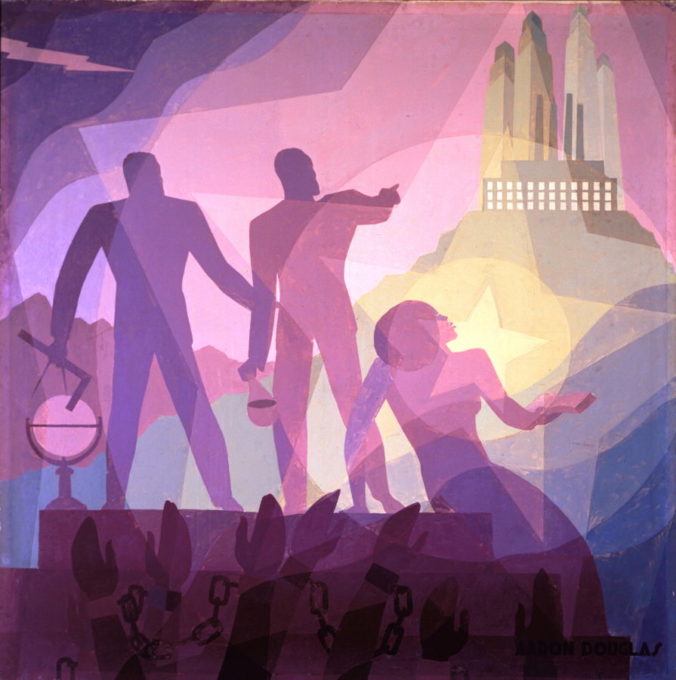
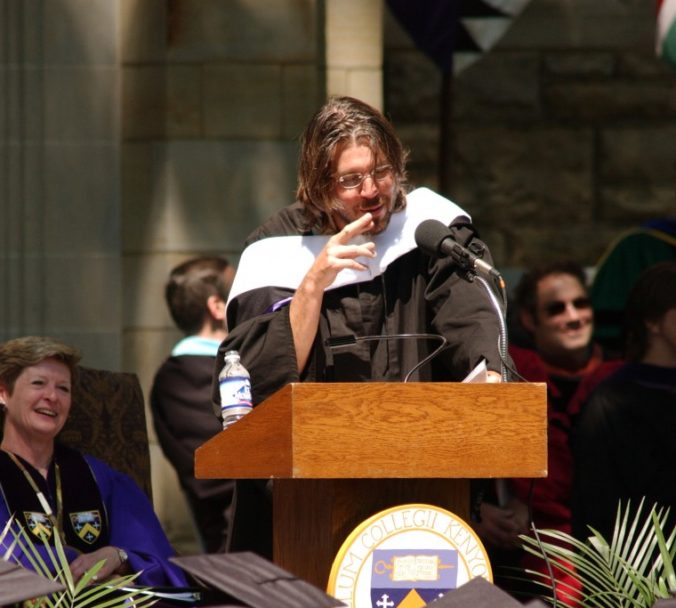

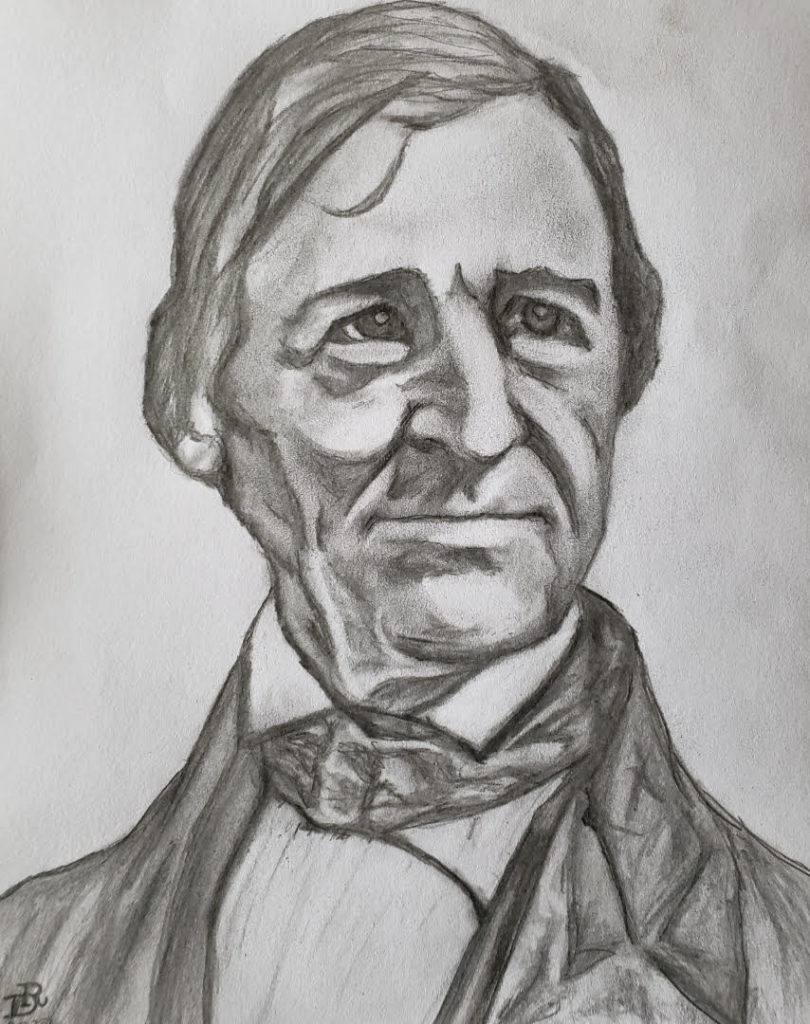
Recent Comments